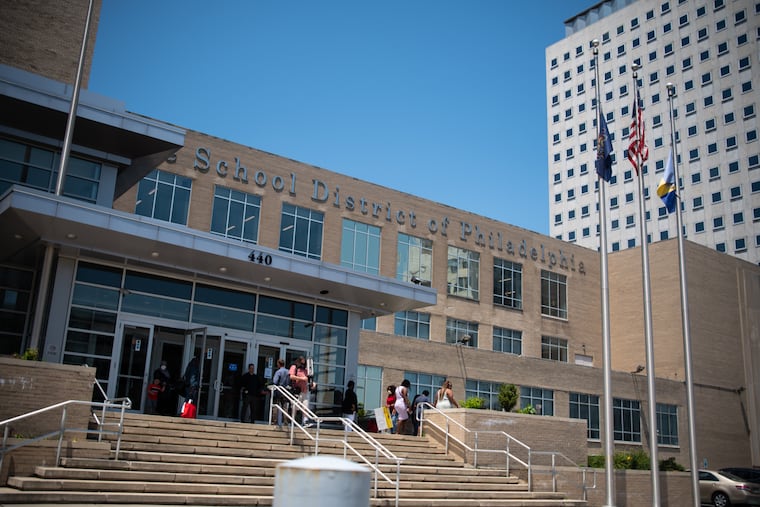Philly schools have a first-look $4.5 billion budget: takeaways from the school board meeting
“When we got more resources, we got better,” said vice president Mallory Fix-Lopez, who attended her last meeting as a school board member.

The Philadelphia school board on Thursday night adopted the broad outlines of a $4.5 billion budget for the 2024-25 school year, with officials promising to prioritize classroom spending even as federal funds dry up.
Because Pennsylvania’s largest school district — and the only school system in the commonwealth unable to raise its own revenue — has costs that are rising faster than revenues, it projects an $88 million gap but ultimately balancing its budget with financial reserves.
COVID relief funds paid for 129 assistant principals, 110 teachers, 35 school climate managers, 26 counselors and 46 climate staff this school year, officials said. The school system will spend $49 million to keep them, Superintendent Tony B. Watlington Sr. said.
“We are committed to doing everything we can to protect the classroom at all costs,” said Watlington.
About that $400 million deficit
Chief Financial Officer Michael Herbstman, in December, had warned that the district might see a deficit of up to $400 million in 2024-25. That was staved off, Herbstman said, in part because of a proposed $100 million in new city funding and a $247 million rise in state funding.
It was also helped, Herbstman said, by $124 million in savings from internal district measures, including moving to a zero-based budgeting process and seeking private and foundation support. Officials indicated they were counting on $6 million in philanthropic support, but did not indicate which group or groups had committed money and what those funds would pay for.
Asked what would happen if the district did not get the resources the mayor and governor proposed, Watlington said contingencies were being prepared.
But “we think it would be unconscionable not to get the resources, given how historically underfunded we are,” the superintendent said.
Board vice president Mallory Fix-Lopez, in her last meeting as a school board member, said it was important to keep telling the district’s story to the right people, in the right way.
“When we got more resources, we got better,” Fix-Lopez said.
Year-round school?
Included in the 2024-25 budget are a restart of the district’s Parent University, which will offer classes for families, the purchase of new English language arts curriculum, recruiting more Black and Latino male teachers and principals, and piloting year-round school.
No price tag was assigned to any of those items, and no details were forthcoming. Year-round school, in particular, is a closely watched item, identified by Mayor Cherelle L. Parker as a priority during her campaign, though the district had tried and discontinued it in the early 2000s.
Parker, in January, shifted her language around year-round school a bit at Watlington’s State of the Schools address, calling it “year-round access to educational opportunities during nontraditional times. Some people refer to it as out-of-school-time. I called it year-round school during the campaign. I want to say to you, you can call it whatever you want to call it. I want young people to have access to those opportunities year-round.”
The people say: No to leveling, too many online programs
In meetings and surveys about budget priorities, some common themes were heard, Herbstman said: People underscored the necessity of preserving the positions created by federal funds. They said the district’s aging facilities need significant improvement. They indicated schools have too many adaptive online programs, and said not all of them are well used.
And they pushed back on leveling, the district’s process of shifting teachers around weeks into the school year based on actual enrollment.
Herbstman said the district had calculated it would take $11 million to halt leveling completely next year, assuming some schools will still need extra teachers due to additional student enrollment. (He said that’s a danger, because the district has not been able to fill some teaching positions.)
School-based concerns raised at Girls’ High, GAMP
Parents from two Philadelphia schools pushed back on the budgeting process, saying their schools were projected to lose key staff and possibly programs.
Girls’ High supporters were out in force. Parent Rachel Anne Nielsen said that in addition to a lack of transparency around the school’s principal selection process, Girls’ is set to lose teachers who work with the robotics program and teach International Baccalaureate classes.
“We have been left in utter chaos,” said Nielsen, adding that she and others feel the school is being “abandoned. I’m really upset about this, and I know that many other parents are upset ... please, please do something to help our school.”
Kathryn Ott Lovell, a parent of two students at Girard Academic Music Program, or GAMP, said the district’s enrollment projections for the South Philadelphia magnet are off, and as a result, the school is set to lose $200,000 from its budget, meaning it must cut two crucial staff members.
It feels like “spring leveling,” Ott Lovell said, “a fire drill, a best-guess budget that won’t pan out. I guess I would plead with the school district leadership and the board. These people matter to us. If these great faculty members get transfer opportunities, we may lose them.”
What’s next?
The school board unanimously adopted the so-called lump sum budget, just the bottom line of the spending plan, on Thursday night.
Now begins two months of discussion and action on the budget, with a school board budget hearing scheduled for April 25, City Council scheduled to hold hearings on April 30, and final board adoption scheduled for May 30.